仁爱版九年级英语全一册 Unit 3 English around the World Topic 2 Section D课件(共15张PPT)
文档属性
| 名称 | 仁爱版九年级英语全一册 Unit 3 English around the World Topic 2 Section D课件(共15张PPT) |
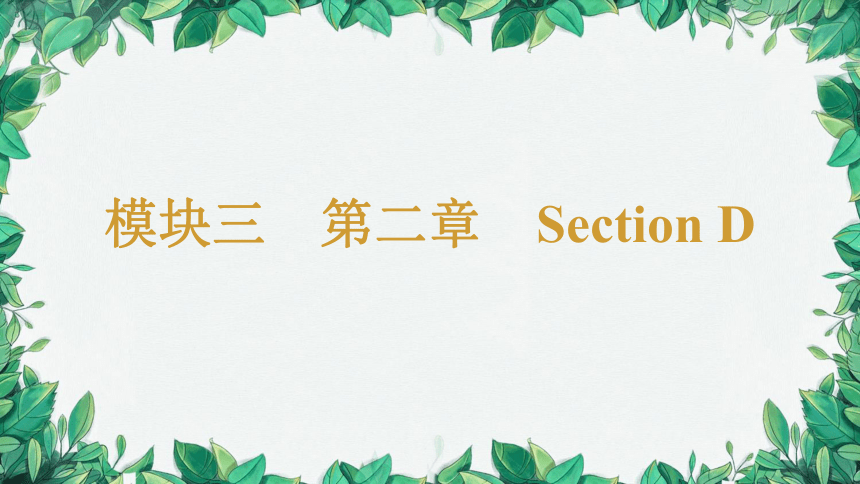
|
|
| 格式 | pptx | ||
| 文件大小 | 1.7MB | ||
| 资源类型 | 教案 | ||
| 版本资源 | 仁爱科普版 | ||
| 科目 | 英语 | ||
| 更新时间 | 2023-07-03 00:00:00 | ||
图片预览

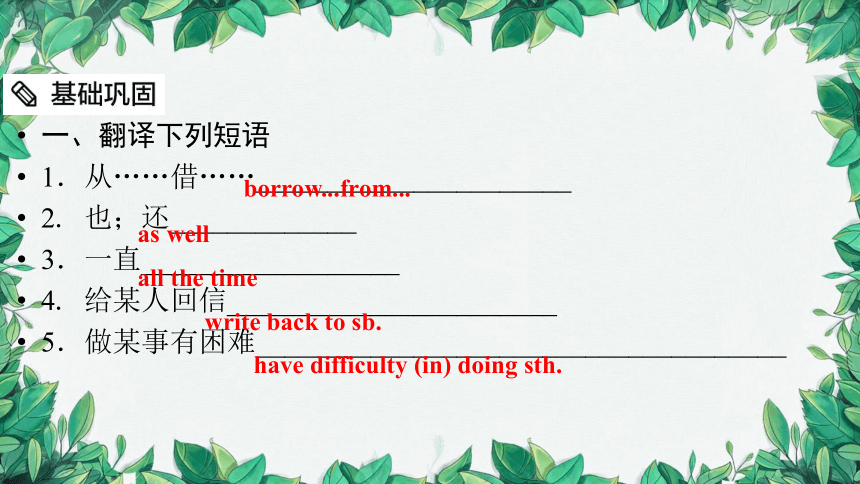
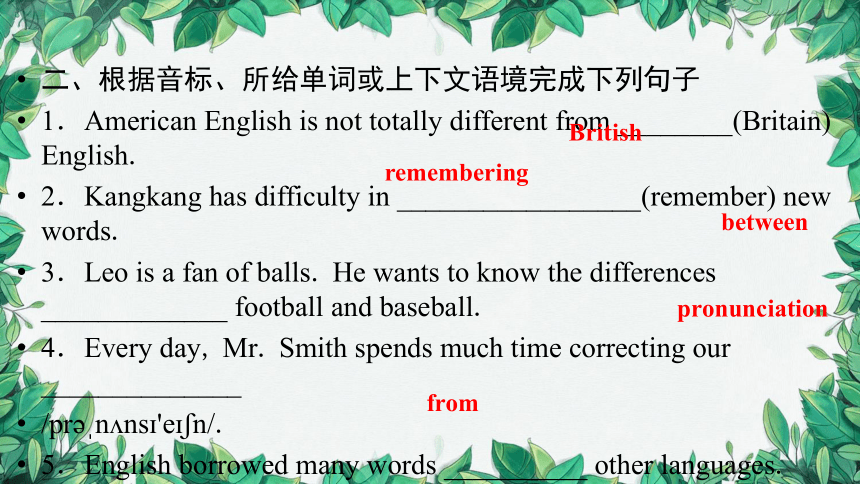
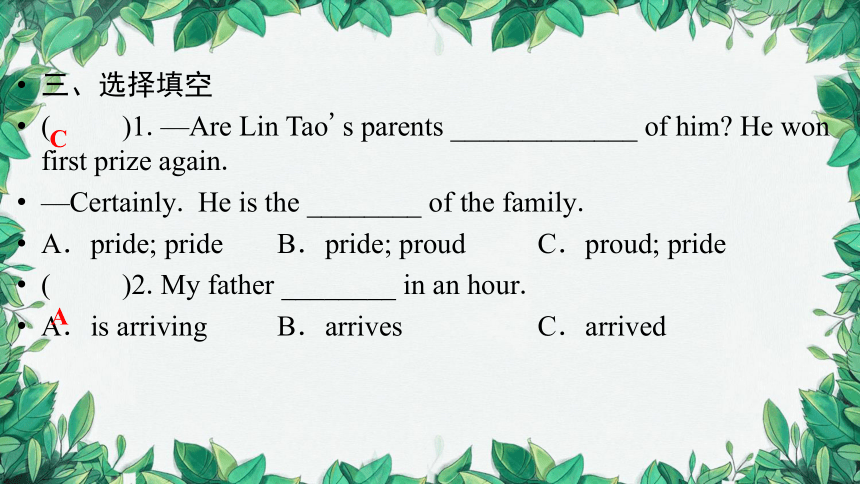
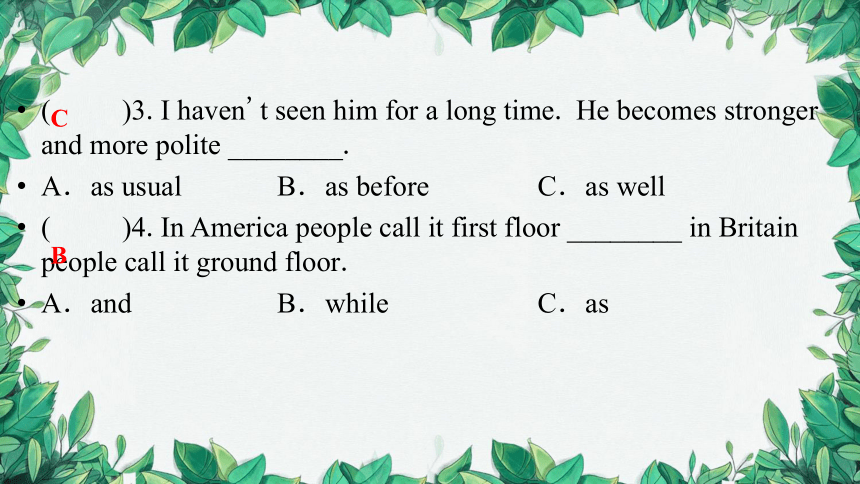
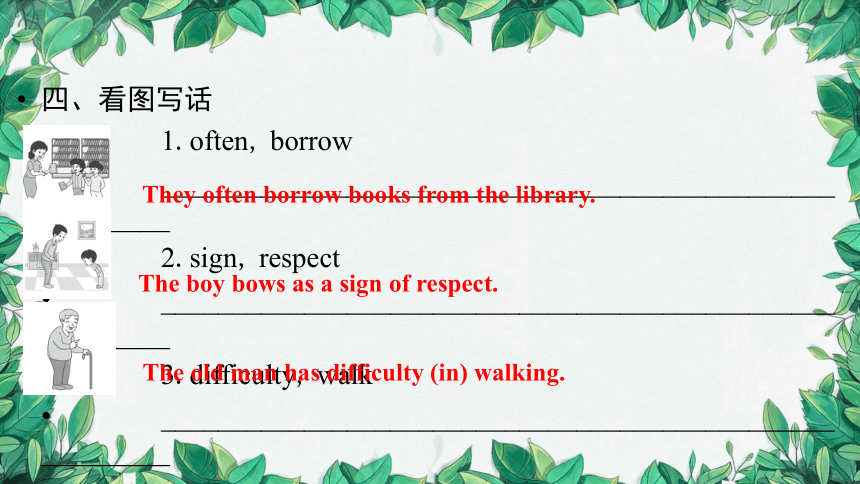
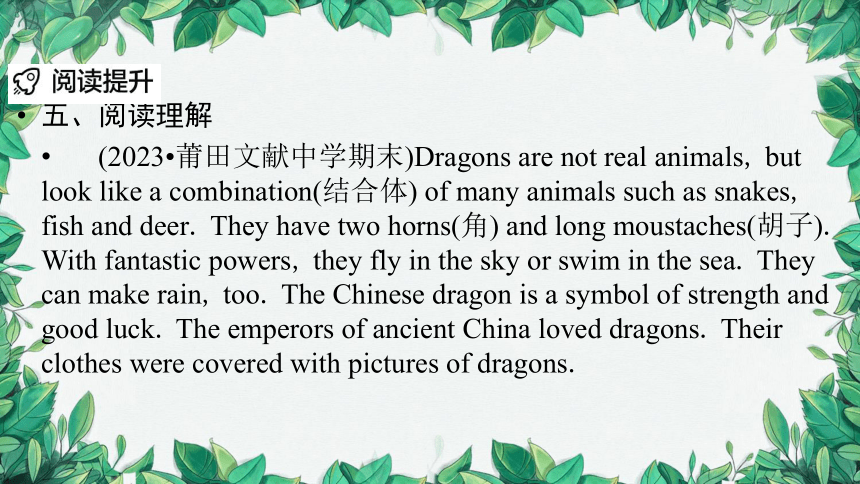
文档简介
(共15张PPT)
模块三 第二章 Section D
一、翻译下列短语
1.从……借……______________________
2. 也;还_____________
3.一直__________________
4. 给某人回信_______________________
5.做某事有困难_____________________________________
borrow...from...
as well
all the time
write back to sb.
have difficulty (in) doing sth.
二、根据音标、所给单词或上下文语境完成下列句子
1.American English is not totally different from ________(Britain) English.
2.Kangkang has difficulty in _________________(remember) new words.
3.Leo is a fan of balls. He wants to know the differences _____________ football and baseball.
4.Every day, Mr. Smith spends much time correcting our ______________
/pr n ns 'e n/.
5.English borrowed many words __________ other languages.
British
remembering
between
pronunciation
from
三、选择填空
( )1.—Are Lin Tao's parents _____________ of him He won first prize again.
—Certainly. He is the ________ of the family.
A.pride; pride B.pride; proud C.proud; pride
( )2.My father ________ in an hour.
A.is arriving B.arrives C.arrived
C
A
( )3.I haven't seen him for a long time. He becomes stronger and more polite ________.
A.as usual B.as before C.as well
( )4.In America people call it first floor ________ in Britain people call it ground floor.
A.and B.while C.as
C
B
四、看图写话
1.often, borrow
________________________________________________________
2.sign, respect
________________________________________________________
3.difficulty, walk
________________________________________________________
They often borrow books from the library.
The boy bows as a sign of respect.
The old man has difficulty (in) walking.
五、阅读理解
(2023 莆田文献中学期末)Dragons are not real animals, but look like a combination(结合体) of many animals such as snakes, fish and deer. They have two horns(角) and long moustaches(胡子). With fantastic powers, they fly in the sky or swim in the sea. They can make rain, too. The Chinese dragon is a symbol of strength and good luck. The emperors of ancient China loved dragons. Their clothes were covered with pictures of dragons.
We are proud to call ourselves the “descendants(传人) of the dragon”. In Chinese, “excellent” people are often called “dragons”. A number of Chinese sayings and idioms(习语)talk about dragons, for example, “Hoping one's child will become a dragon” which means hoping he or she will be successful. It is said that people born in the Year of the Dragon are usually creative, confident, brave and quick-tempered.
There are also some traditional festivals about dragons in China, such as the Dragon Head-Raising Day and the Dragon Boat Festival. We have different kinds of activities to celebrate them. These two festivals come every year, but the Year of the Dragon comes every twelve years. It was the Year of the Dragon eleven years ago.
The dragon is very important in Chinese culture. As the “descendants of the dragon”, it is necessary for us to know the views on dragons in our culture. It can help us understand why our parents always want us to be “dragons”.
( )1.What does the Chinese dragon symbolize
A.A combination of many animals.
B.Chinese sayings and idioms.
C.Traditional festivals.
D.Strength and good luck.
D
( )2.What do the underlined words “Hoping one's child will become a dragon” in the passage mean in Chinese
A.龙马精神 B.龙飞凤舞
C.望子成龙 D.龙腾虎跃
C
( )3.What characteristics(特征) may the people born in the Year of the Dragon have
A.Creative, confident, brave and powerful.
B.Creative, confident, brave and quick-tempered.
C.Lovely, confident, brave and quick-tempered.
D.Lucky, confident, creative and successful.
B
( )4.Which of the following years is the Year of the Dragon
A.1998. B.2008.
C.2012. D.2018.
C
( )5. According to the passage, which of the following is TRUE
A.Dragons are real animals.
B.There are many Chinese sayings and idioms about dragons.
C.People born in the Year of the Dragon must be successful.
D.The “descendants of the dragon” are often called “dragons”.
B
模块三 第二章 Section D
一、翻译下列短语
1.从……借……______________________
2. 也;还_____________
3.一直__________________
4. 给某人回信_______________________
5.做某事有困难_____________________________________
borrow...from...
as well
all the time
write back to sb.
have difficulty (in) doing sth.
二、根据音标、所给单词或上下文语境完成下列句子
1.American English is not totally different from ________(Britain) English.
2.Kangkang has difficulty in _________________(remember) new words.
3.Leo is a fan of balls. He wants to know the differences _____________ football and baseball.
4.Every day, Mr. Smith spends much time correcting our ______________
/pr n ns 'e n/.
5.English borrowed many words __________ other languages.
British
remembering
between
pronunciation
from
三、选择填空
( )1.—Are Lin Tao's parents _____________ of him He won first prize again.
—Certainly. He is the ________ of the family.
A.pride; pride B.pride; proud C.proud; pride
( )2.My father ________ in an hour.
A.is arriving B.arrives C.arrived
C
A
( )3.I haven't seen him for a long time. He becomes stronger and more polite ________.
A.as usual B.as before C.as well
( )4.In America people call it first floor ________ in Britain people call it ground floor.
A.and B.while C.as
C
B
四、看图写话
1.often, borrow
________________________________________________________
2.sign, respect
________________________________________________________
3.difficulty, walk
________________________________________________________
They often borrow books from the library.
The boy bows as a sign of respect.
The old man has difficulty (in) walking.
五、阅读理解
(2023 莆田文献中学期末)Dragons are not real animals, but look like a combination(结合体) of many animals such as snakes, fish and deer. They have two horns(角) and long moustaches(胡子). With fantastic powers, they fly in the sky or swim in the sea. They can make rain, too. The Chinese dragon is a symbol of strength and good luck. The emperors of ancient China loved dragons. Their clothes were covered with pictures of dragons.
We are proud to call ourselves the “descendants(传人) of the dragon”. In Chinese, “excellent” people are often called “dragons”. A number of Chinese sayings and idioms(习语)talk about dragons, for example, “Hoping one's child will become a dragon” which means hoping he or she will be successful. It is said that people born in the Year of the Dragon are usually creative, confident, brave and quick-tempered.
There are also some traditional festivals about dragons in China, such as the Dragon Head-Raising Day and the Dragon Boat Festival. We have different kinds of activities to celebrate them. These two festivals come every year, but the Year of the Dragon comes every twelve years. It was the Year of the Dragon eleven years ago.
The dragon is very important in Chinese culture. As the “descendants of the dragon”, it is necessary for us to know the views on dragons in our culture. It can help us understand why our parents always want us to be “dragons”.
( )1.What does the Chinese dragon symbolize
A.A combination of many animals.
B.Chinese sayings and idioms.
C.Traditional festivals.
D.Strength and good luck.
D
( )2.What do the underlined words “Hoping one's child will become a dragon” in the passage mean in Chinese
A.龙马精神 B.龙飞凤舞
C.望子成龙 D.龙腾虎跃
C
( )3.What characteristics(特征) may the people born in the Year of the Dragon have
A.Creative, confident, brave and powerful.
B.Creative, confident, brave and quick-tempered.
C.Lovely, confident, brave and quick-tempered.
D.Lucky, confident, creative and successful.
B
( )4.Which of the following years is the Year of the Dragon
A.1998. B.2008.
C.2012. D.2018.
C
( )5. According to the passage, which of the following is TRUE
A.Dragons are real animals.
B.There are many Chinese sayings and idioms about dragons.
C.People born in the Year of the Dragon must be successful.
D.The “descendants of the dragon” are often called “dragons”.
B
同课章节目录
- Unit 1 The Changing World
- Topic 1 Our country has developed rapidly.
- Topic 2 The population in developing countries is
- Topic 3 The world has changed for the better.
- Unit 2 Saving the earth.
- Topic 1 Pollution has causes too many problems.
- Topic 2 All these problems are very serious.
- Topic 3 What can we do to protect the environment
- Unit 3 English around the World
- Topic 1 English is widely spoken around the world.
- Topic 2 Some things usually have different meaning
- Topic 3 Could you give us some advice on how to l
- Unit 4 Amazing Science
- Topic 1 When was it invented?
- Topic 2 I'm excited about the things that will be
- Topic 3 China is the third nation that sent a pers
